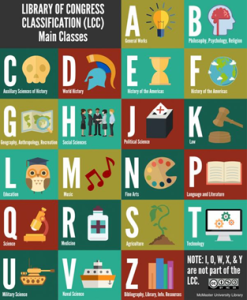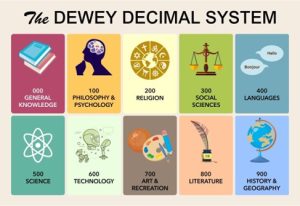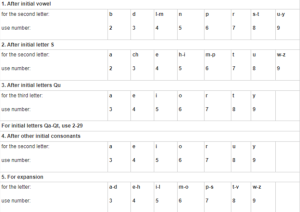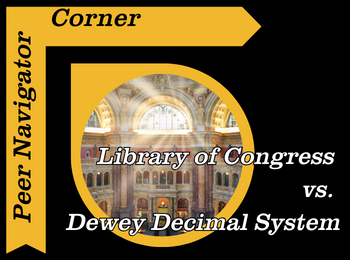By: Lorelai Clubb
Moving from your high school or public library is already a challenge due to the amazing size of the building and the resources available at MU, but there is another new factor to consider when looking for books at Ellis Library. The University of Missouri Libraries uses the Library of Congress (LoC) classification system, which is very different from the Dewey Decimal System (DDS) you are likely used to. But don’t worry! Understanding how to navigate LoC is easy!
What is the LoC System and Why do we use it?
Firstly, academic libraries use the Library of Congress system because it allows for more items to be cataloged in more specific ways. Each LoC call number is directly attached to a specific resource (i.e. a book) to allow for you to find that resource easier. The LoC system is better for organizing a large number of resources centered around a specific subject. Since we have so many amazing materials here at Ellis, LoC allows us to group subjects easier and make it simpler for you to find the resources you need. The LoC system has 21 different main classes based on letters and then thousands based on numbers, while DDS only has 10 classes based on numbers alone.

(Source: High Point University Libraries – https://www.highpoint.edu/library/2022/01/25/smith-library-begins-transitioning-book-collection-to-library-of-congress-classification/)
So, what is the Dewey Decimal System then?
The Dewey Decimal System classification system is typically used at public and school libraries because it’s a smaller and more general system, which is better for smaller collections of books. While DDS can be helpful in smaller libraries, it has several flaws that make it more challenging to use in our giant academic library collections. For one, fewer category options leads to diverse topics being squished under one umbrella, making them more challenging to find. Additionally, DDS classifies topics in a somewhat confusing way. For example, if you were looking for a book about human anatomy, you would need to look under the “Technology” section, NOT the “Science” section. Other topics that don’t seem to really belong in “Technology” can also be found there, such as “Public Relations” and “Accounting.” The LoC system removes this confusing problem.

(Source – Saline County Libraries: https://www.salinecountylibrary.org/dewey-do-not-phasing-out-the-dewey-decimal-system/)
Breaking Down the LoC System Call Numbers
A Library of Congress call number is comprised of 4 parts:
- Class/Subclass
- Topic
- Cutter Number
- Publication Date
For example, this call number: HV4708 .R83 2011 is one we have at Ellis Library. Let’s break down the number to figure out what book this is about!
- Class/Subclass – “HV”
The class/subclass refers to the first one to two letters of the call number. The first letter, “H” is the “social sciences” class. “HV” is the subclass of “H” that refers specifically to “social welfare”. - Topic – “4708”
Now that we know our class is in “social welfare,” we can use the number provided to find the specific topic section. By looking at the LoC classification system, we can see that the 4700s refers to Animal Welfare. Now we know what topic our book is based purely on a few numbers and letters. Isn’t that cool? - Cutting Number – “.R83”
The “cutter number” refers to the author of the material. The name “cutter” doesn’t actually refer to something being “cut”, it is named after its creator, Charles Cutter. The cutter number is a letter followed by two numbers. The first letter, “R” in this case, is the first name of our author. The “8” and “3” are the next two letters of the author’s name, but numbers are used in place of more letters. Understanding this part is a little more complicated, but the Library of Congress website has a handy table for us to use to decipher what the two numbers mean:

(Source – Library of Congress: https://www.loc.gov/aba/pcc/053/table.html) - Publication Date – “2011”
This part is the easiest part of the LoC call number. The “2011” refers to when the book was published.
Now we know this book is about animal welfare, written by someone with a last name beginning with “Rud”, and the book was published in 2011. The book in question is Loving Animals: Toward a New Animal Advocacy by Kathy Rudy.
Summary
While it might seem complicated, the Library of Congress classification system allows for us at Mizzou and other academic libraries to hold more resources and makes it much easier to locate materials on certain subjects. If you are having trouble navigating the library and finding a book, no fear! Just stop by the “Ask Here” desk on the first floor directly up the stairs of the West Entrance (Speaker’s Circle entrance) and to the right. Our “Ask Here” desk is staffed by students just like you who understand how daunting the Ellis Library can be at times. No question is too silly or too small, stop by and ask for directions and help 10am to 10pm Monday through Thursday, and noon to 10 pm on Sundays.
